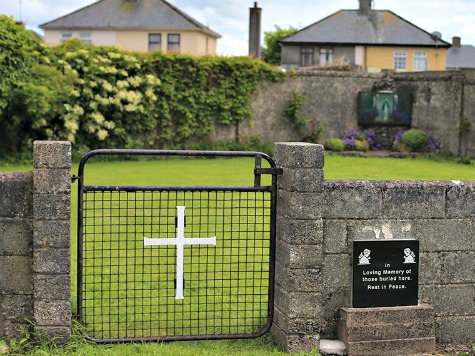
Outrage over a home in Ireland for unwed mothers has been emerging in recent news reports. The home, run from 1926 to 1961, was found originally in 1975 to have a hidden mass grave with almost 800 dead children but has only recently been further investigated.
Decades of condemning unwed mothers bring flashbacks of horrors like the murder of babies by abortionist Kermit Gosnell.
A 1944 government inspection of Ireland’s Tuam mother and baby home uncovered evidence of malnutrition among the 271 children and 61 unwed mothers, according to The Guardian. Further, The Irish Examiner reported adoption advocate Susan Lohan as saying, “The research suggests that the mortality rate in these homes was in excess of double the national average.” She continued, “These were state-funded homes.”
“Gosnell is serving several life sentences for murdering live babies and killing several women at his Philadelphia abortion clinic,” states the website for the Gosnell movie. To bring awareness to issues like the tragedy of serial killer Gosnell, a movie is being made with support from crowd funding. Contributors have given $2.25 million towards producing this movie and bringing the full story to the public.
But the story of Gosnell is not an isolated event. Dubbed the “Texas Gosnell,” abortionist Douglas Karpen is being sued by a victim of a botched abortion but has also been accused of additional atrocities by employees of his clinic. They accuse him of “twisting the heads off babies born alive, choking them to death or simply tossing them alive into trash bags.”
In March, Breitbart London reported, “The bodies of at least 15,500 unborn babies have been incinerated over the past two years, with some of them used to generate power to heat NHS hospitals, a new investigation has revealed.”
History is not kind to programs like the Tuam home, which seemed a reasonable solution to a prior generation. Catherine Corless, the woman bringing the mass grave to light, remembers seeing the children segregated in her classes as a child and playing mean tricks on them with her friends, reports News.com.au. The site quotes Corless: “I realised that the children [she] taunted had nobody.” She added, “Years after, I asked myself what did I do to that poor little girl that never saw a sweet? That has stuck with me all my life.”
But while archaic ideas suggest eliminating and hiding unplanned pregnancies of unwed mothers, today’s groups are acting to provide caring solutions and support for those in such trying situations.
Under the intense scrutiny of public judgment, a young Bristol Palin has walked the tough path of being pregnant at the age of 17 and faced her youth as an unwed mother. She took her experiences and not only wrote a book about her story, called Not Afraid of Life: My Journey So Far, but also travels around the country to speak about “inspirational and pro-life topics.” Palin blogs about issues of culture and faith on Patheos.com.
Operating with the purpose of caring for the poor and those without family support, charities like Elizabeth House in Los Angeles and Birth Choice in San Marcos and Oceanside, California offer hope and support to women and/or men facing an unexpected pregnancy. A blog on Patheos.com records the work of Elizabeth House, which offers women “shelter, hope and support,” according to the ministry’s stated goal.
Similar to Elizabeth House, Birth Choice “offers pregnancy tests, ultrasound and counseling for women and men. All services are free and completely confidential. Our staff is made up of volunteers who care about you and your health,” states Birth Choice’s Facebook page. Volunteers offer hope and help with the love of Jesus, answering the many questions that may arise with an unexpected pregnancy in a spirit of grace, not condemnation.
Charities such as these are a great resource to those who need support in those trying times, operating with accountability to their communities and offering hope that government does not.

COMMENTS
Please let us know if you're having issues with commenting.